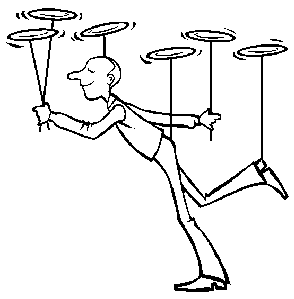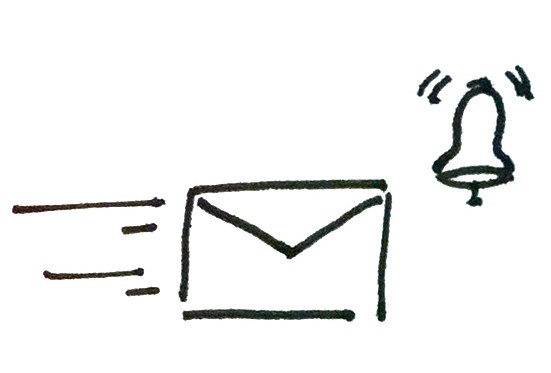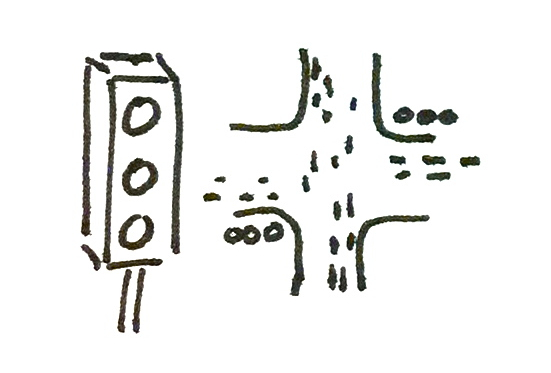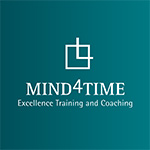Most productivity authors are fairly consensual about the most important, valuable and limited resource for getting results: focus! In a world that grows overwhelming each day, there's a lot that can be done to improve focus and escape the permanent attention battle that's set upon many of us...
What is Focus?
Focus is a measure of attention, or mental processing power. It refers to how much of your brain capacity is assigned to a certain mental activity. We are more or less focused on something.
That something, that brain activity, may have multiple possible origins. It could be processing an outside input entering your sensorial channels - for example when you are reading this text, and a part of your brain is processing it, giving it meaning, rearranging stuff inside your mind when it makes sense. If an email alert now smoothly waves at the bottom corner of your screen - "New message from John Smith!" - a part of your brain will likely address that input, even if you continue to read. Your phone ringing or someone asking you something will also demand a focus redistribution, probably more abrupt and effective.
Another example of brain activities that may fight for your attention can be an internal thought or dialogue, or a concern, for instance reviewing and ruminating some rough discussion you had recently, nagging yourself about what you should or shouldn't have said. It may be computing a decision, evaluating options. It could be conducting a complex activity like playing a difficult piano piece or a fast ping-pong game. Could be an alert for food or sleep or you could simply have an excruciating tooth pain that makes it impossible to think properly on anything else. All these (and many others) would require at least a part of your mental processing power to be assigned to them. They get a part of your focus.
Limited "mental RAM" = limited focus
Usually at any given moment many different brain activities are happening at the same time. We share focus between them. We also know that if too many of them fight for our limited mental resources, none will be done truly well. Imagine a computer running Word + Excel + PDF + Outlook + Firefox + 5 other applications + videos, photos and songs, all at the same time!!! It eventually gets the job done, but might just be painfully slow, right? Our brain works pretty much the same way: things slow down if we overload it. Important decisions start taking ages, and simple operations drag themselves all over the place, no matter how hard you try rushing things around you. The walk in the park doesn’t feel so nice, food doesn't taste so good, and your kid asks you to close your laptop and really give him some decent attention. Simply said, you are "out of focus" and very likely your outcomes are sub-optimal. Knowing and accepting our focus limitation is the first step to improve your choices about what activities to address at any given moment. That is crucial not only to increase productivity but also to enjoy the present moment.
Focus and Safety
Focus depends heavily on safety. Safety is a structural value for most of us. Really important. Focus on some activity will be higher or lower according to how safe you feel about not being doing other activities that need your attention as well. If you suspect it's not ok to be not doing the others, you’ll just keep an eye on them, internally assessing how dangerous it is to be not doing them instead. We may fall into that trap about new inputs as well. It's like if you are in a war trench, trying desperately to unjam your gun, while checking every second if the approaching enemy is still at a safe distance. Typically, that unsafety feeling and constant surveillance mode costs a bunch of your focus, mental energy and even joy! You can spend a hole weekend thinking about how you might be getting a little bit of work done to catch up, and end up loosing on both sides: no work done + no truly relaxed weekend...
Too many threads?
 When we're out of focus, goals, directions and possibilities are just too many, and they seem to keep drifting all the time... We may have many things happening, but that's far from meaning we're guaranteeing valuable output or using our brain efficiently at all. It may happen that while many things are moving forward, we're just not feeling what we want to be feeling that often. Try a fundamental question here: "How sure are you that reading this blog is exactly what you're supposed to be doing right now?". If you are unsure, part of your focus will be wondering about other stuff you feel you should also be doing. In fact, knowing what is it that you're not doing can prove very effective, as well as knowing what is it that you really want to have happened in the end of your day (or week, or quarter, or life)!
When we're out of focus, goals, directions and possibilities are just too many, and they seem to keep drifting all the time... We may have many things happening, but that's far from meaning we're guaranteeing valuable output or using our brain efficiently at all. It may happen that while many things are moving forward, we're just not feeling what we want to be feeling that often. Try a fundamental question here: "How sure are you that reading this blog is exactly what you're supposed to be doing right now?". If you are unsure, part of your focus will be wondering about other stuff you feel you should also be doing. In fact, knowing what is it that you're not doing can prove very effective, as well as knowing what is it that you really want to have happened in the end of your day (or week, or quarter, or life)!
About multitasking
There's a lot said about multitasking... I should get a bit specific: by multitasking I'm referring here to dealing with more than one mental process at the same time. It is a complex issue to discuss in a simple way. To give you a practical example, I have a challenge for you that will require a fair deal of focus: just count the words of my next sentence in bold while you read it. A part of your brain is now trying to make sense out of the written ideas, while another part will be spotting words and keeping a sort of counter, incremented for each separate word you spot. There you go, a very simple example of two different activities working at the same time. Gets a bit slower, right? Maybe you even gave up. By the way, if you didn't, how many words were there after all*?
I'll be talking more on multitasking on my next article. Until then, try a TRICK!..
That something, that brain activity, may have multiple possible origins. It could be processing an outside input entering your sensorial channels - for example when you are reading this text, and a part of your brain is processing it, giving it meaning, rearranging stuff inside your mind when it makes sense. If an email alert now smoothly waves at the bottom corner of your screen - "New message from John Smith!" - a part of your brain will likely address that input, even if you continue to read. Your phone ringing or someone asking you something will also demand a focus redistribution, probably more abrupt and effective.
Another example of brain activities that may fight for your attention can be an internal thought or dialogue, or a concern, for instance reviewing and ruminating some rough discussion you had recently, nagging yourself about what you should or shouldn't have said. It may be computing a decision, evaluating options. It could be conducting a complex activity like playing a difficult piano piece or a fast ping-pong game. Could be an alert for food or sleep or you could simply have an excruciating tooth pain that makes it impossible to think properly on anything else. All these (and many others) would require at least a part of your mental processing power to be assigned to them. They get a part of your focus.
Limited "mental RAM" = limited focus
Usually at any given moment many different brain activities are happening at the same time. We share focus between them. We also know that if too many of them fight for our limited mental resources, none will be done truly well. Imagine a computer running Word + Excel + PDF + Outlook + Firefox + 5 other applications + videos, photos and songs, all at the same time!!! It eventually gets the job done, but might just be painfully slow, right? Our brain works pretty much the same way: things slow down if we overload it. Important decisions start taking ages, and simple operations drag themselves all over the place, no matter how hard you try rushing things around you. The walk in the park doesn’t feel so nice, food doesn't taste so good, and your kid asks you to close your laptop and really give him some decent attention. Simply said, you are "out of focus" and very likely your outcomes are sub-optimal. Knowing and accepting our focus limitation is the first step to improve your choices about what activities to address at any given moment. That is crucial not only to increase productivity but also to enjoy the present moment.
Focus and Safety
Focus depends heavily on safety. Safety is a structural value for most of us. Really important. Focus on some activity will be higher or lower according to how safe you feel about not being doing other activities that need your attention as well. If you suspect it's not ok to be not doing the others, you’ll just keep an eye on them, internally assessing how dangerous it is to be not doing them instead. We may fall into that trap about new inputs as well. It's like if you are in a war trench, trying desperately to unjam your gun, while checking every second if the approaching enemy is still at a safe distance. Typically, that unsafety feeling and constant surveillance mode costs a bunch of your focus, mental energy and even joy! You can spend a hole weekend thinking about how you might be getting a little bit of work done to catch up, and end up loosing on both sides: no work done + no truly relaxed weekend...
Too many threads?
 When we're out of focus, goals, directions and possibilities are just too many, and they seem to keep drifting all the time... We may have many things happening, but that's far from meaning we're guaranteeing valuable output or using our brain efficiently at all. It may happen that while many things are moving forward, we're just not feeling what we want to be feeling that often. Try a fundamental question here: "How sure are you that reading this blog is exactly what you're supposed to be doing right now?". If you are unsure, part of your focus will be wondering about other stuff you feel you should also be doing. In fact, knowing what is it that you're not doing can prove very effective, as well as knowing what is it that you really want to have happened in the end of your day (or week, or quarter, or life)!
When we're out of focus, goals, directions and possibilities are just too many, and they seem to keep drifting all the time... We may have many things happening, but that's far from meaning we're guaranteeing valuable output or using our brain efficiently at all. It may happen that while many things are moving forward, we're just not feeling what we want to be feeling that often. Try a fundamental question here: "How sure are you that reading this blog is exactly what you're supposed to be doing right now?". If you are unsure, part of your focus will be wondering about other stuff you feel you should also be doing. In fact, knowing what is it that you're not doing can prove very effective, as well as knowing what is it that you really want to have happened in the end of your day (or week, or quarter, or life)!About multitasking
There's a lot said about multitasking... I should get a bit specific: by multitasking I'm referring here to dealing with more than one mental process at the same time. It is a complex issue to discuss in a simple way. To give you a practical example, I have a challenge for you that will require a fair deal of focus: just count the words of my next sentence in bold while you read it. A part of your brain is now trying to make sense out of the written ideas, while another part will be spotting words and keeping a sort of counter, incremented for each separate word you spot. There you go, a very simple example of two different activities working at the same time. Gets a bit slower, right? Maybe you even gave up. By the way, if you didn't, how many words were there after all*?
I'll be talking more on multitasking on my next article. Until then, try a TRICK!..
Gonçalo Gil Mata
www.WhatsTheTrick.com *36
NOW TRY A TRICK!...

|T| Turn off e-mail alerts ...>>

|T| Work in time slots ...>>
see more TRICKS - vote and comment on them!




Cool stuff! I´ll keep focused on the next articles!